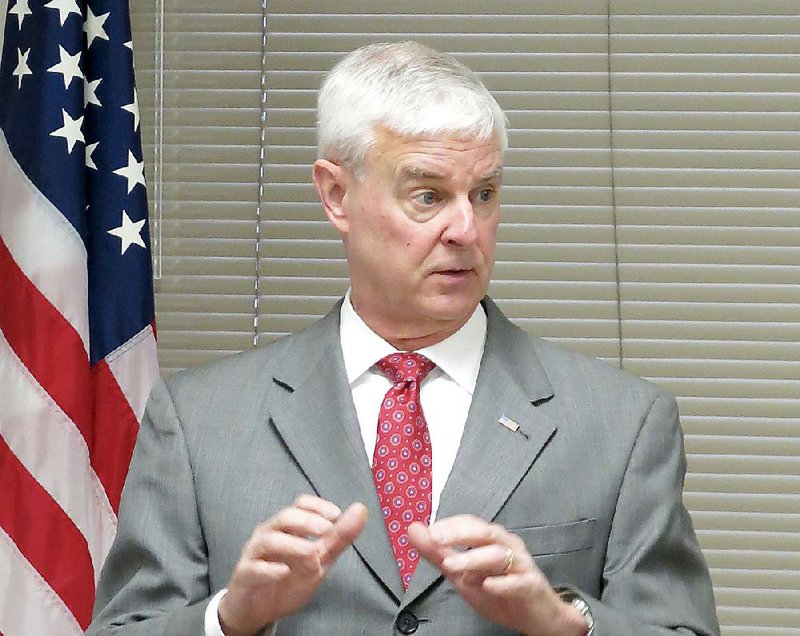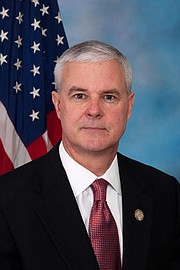WASHINGTON -- Members of a special joint committee tasked with recommending ways to overhaul spending practices say Congress' current budgeting system is broken, but they aren't ready to recommend any steps to improve matters.
On Thursday, members of the Joint Select Committee on Budget and Appropriations Process Reform derailed a package of proposals that initially had bipartisan support. Among other things, it called for switching from annual to biennial budgeting.
As the likely outcome of Thursday's vote became apparent, U.S. Rep. Steve Womack, R-Ark., criticized the committee -- which he co-chaired -- for failing to do its job.
"I'm a football guy, and I believe in moving the chains. I believe in first downs. ... Incremental improvement is better than no improvement at all," he said. "We've produced a product that will move the needle. But yet we are unwilling to take that final affirmative vote to move it across the finish line and put it into the hands of leadership in the bodies of the House and Senate. It's like the old saying of wetting oneself in a dark suit. You have a really warm feeling, but nobody notices. That's precisely where we are at this moment."
U.S. Sen. David Perdue, R-Ga., who ultimately voted against the proposal, argued that the joint committee had been sabotaged by top congressional leadership.
"We got gamed here, in my opinion, in many ways, by leadership: House, Senate, Republican, Democrat," he said.
Hours after the joint committee's vote, Womack and U.S. Rep. John Yarmuth, D-Ky., introduced the Bipartisan Budget and Appropriations Process Reform Act of 2018. It contains "the Joint Select Committee's bipartisan recommendations relevant to the House of Representatives," the lawmakers said in a joint news release.
Today was the deadline for the 16-member committee to submit its report and recommendations.
The effort to torpedo the bipartisan package was led by one of its primary authors -- a co-chairman, U.S. Rep. Nita Lowey, D-N.Y.
The 15-term lawmaker and three of her Democratic colleagues voted "present" -- a move that prevented the package from receiving enough votes to be adopted and forwarded to the House and Senate.
Republican members voted 5-3 to pass the proposal. In addition to those voting "present," two Democrats supported the measure; two opposed it.
Critics said the proposed changes were inadequate.
But U.S. Rep. Jodey Arrington, R-Texas, said the proposal deserved to pass.
"In west Texas, a little progress is better than no progress," he said. "We made real friendships and real traction and real progress."
In order to be adopted, the recommendations needed to have the support of a majority of both Republican and Democratic appointees.
Shortly before helping to scuttle the package, Lowey blamed Senate leadership for the impasse.
"As I have said before, I am very proud of the bipartisan work we have done to assemble this package of reforms to the budget and appropriations process. However, as I have raised for weeks, the lack of an agreement between Senate leadership on a fair and bipartisan process for floor consideration opens up our final product to partisan mischief that frankly could undo our work and worse, actually make the budget process even more difficult."
One of the others voting "present," U.S. Sen. Sheldon Whitehouse, D-Rhode Island, praised his colleagues on the committee for their "considerable goodwill, friendship and good work."
But forwarding the recommendations to the Senate would be an exercise in futility, he said, given the positions taken by Senate Majority Leader Mitch McConnell, R-Ky., and Minority Leader Chuck Schumer, D-N.Y.
In the waning days of a lame-duck session, the recommendations wouldn't get anywhere, he said.
"On both sides, there is no interest in going forward in this Congress. I don't think this is a partisan thing, and I'm not trying to take any partisan shots here. That's just the fact of the matter," Whitehouse added.
The Bipartisan Budget Act of 2018, which passed with broad support, mandated creation of a House and Senate joint select committee, giving it until today to "provide recommendations and legislative language that will significantly reform the budget and appropriations process." It had four Republican representatives; four Republican senators; four Democratic representatives; and four Democratic senators.
House Speaker Paul Ryan selected Womack, as House Budget Committee chairman, to serve as the top Republican on the joint committee.
In addition to supporting biennial budgeting, the committee's package, as amended, called for the House and Senate budget committees to hold an annual hearing on the "fiscal state of the nation."
Among other things, it recommended that the chairmen and ranking members of the Senate finance and appropriations committees automatically serve on the Senate Budget Committee.
It also created another route for senators to take a budget resolution to the floor; the goal was to encourage promulgation of budgets that have bipartisan support and set targets for slowing the growth of the national debt.
The national debt is nearing $22 trillion and a string of trillion-dollar annual deficits is forecast for the coming years.
The three Republican "no" votes on the overall package were cast by U.S. Sens. Joni Ernst of Iowa, James Lankford of Oklahoma and Perdue.
They argued that the recommended changes were insufficient. They wanted to force Congress to remain in session to complete its budget and appropriations work. They proposed canceling vacations when necessary and prohibiting the use of government funds to pay for travel once budgetary deadlines have been missed.
"This package does not significantly reform the budget and appropriations process. It does solve some problems, but not all and not significantly," Ernst said.
Two Democrats, U.S. Sens. Michael Bennet of Colorado and Brian Schatz of Hawaii also voted no.
Bennet called the committee's efforts "a real missed opportunity," maintaining that efforts should have been made to avoid government shutdowns and debt-ceiling crises. The Democrats' debt-ceiling proposals were blocked by Republicans.
Despite Thursday's outcome, Bennet gave Womack high marks, telling him, "your leadership has been extraordinary -- both you and your co-chair."
"In a Congress that can't seem to do anything, this place has been an environment, I think, that has been welcoming to people's ideas and progress and discussion."
In an interview after Thursday's vote, Yarmuth called the vote "somewhat of a missed opportunity" but commended Womack for exhibiting "great class and the exact right spirit" during his time as co-chairman.
After Thursday's vote, Womack released a written statement reiterating his concerns about the outcome.
"I am extremely disappointed in our failure and in my colleagues who lacked the 'political will' we have preached is so needed in Washington to vote out this good, bipartisan proposal. Their votes were on politics, not product and proved us deserving of Congress's low approval rating," he said.
Lowey, on the other hand, insisted that the joint committee's efforts had been worthwhile.
"Democrats and Republicans, House [and] Senate, really worked together," she said.
Asked why the joint committee had failed to complete its task, Lowey said, "This institution moves slowly. What was most important, for the record, is the thoughtful presentations of both sides of the aisle. People really participated, and I think that's the best outcome."
A Section on 11/30/2018


